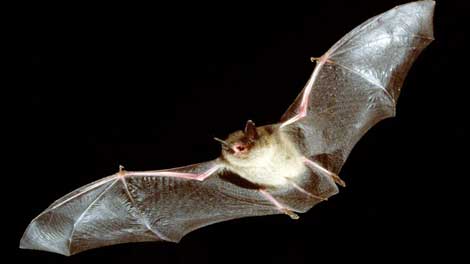PORT TOWNSEND — A bat which bit a Jefferson County resident had rabies, officials have confirmed.
This makes the second bat in two years in south Jefferson County to test positive for rabies, said Dr. Tom Locke, the health officer for Jefferson and Clallam counties, saying the earlier case — in 2012 — also was in the southern part of the county.
In Clallam County, no bat has tested positive for rabies since 2008. Four people were exposed to a bat at the Lake Ozette campground in Olympic National Park.
The bat that was submitted to the state Public Health Lab in Shoreline on July 22 was found outside a home between Quilcene and Brinnon, Locke said.
The resident found the sick bat outside the home and was bitten by it when trying to pick it up, Locke said.
The resident underwent the rabies vaccination process and has recovered, Locke added.
Locke said anyone who sees a bat that appears to be sick should keep away from the animal.
“The highest-risk situation is someone seeing a bat that can’t fly or a bat that is not trying to flee from being close to humans,” Locke said.
“People should keep their distance from any kind of abnormal-behaving bat.”
Bats can pass on the rabies virus to other mammals, including humans, if the bat’s saliva comes in contact with an open wound or a mucus membrane, such as the eyes or nose, said Denis Langlois, public health nurse for Jefferson County Public Health.
Locke said 11 of the 204 bats the state health lab tested in 2011, or about 5 percent, had rabies.
Testing a bat means killing it, Locke said, since the bat’s brain needs to be examined to determine if the bat is infected.
Most calls to the Clallam County health department and Jefferson County Public Health about bats come from residents who have found bats in their homes, Locke said.
Langlois said Jefferson County residents who find bats in their homes and fear they might have come in contact with the animal should phone Jefferson County Public Health at 360-385-9400.
Locke said the same goes for Clallam County residents, who can call the Clallam County health department at 360-417-2274.
If someone finds a bat in their home, Locke and Langlois said a safe effort should be made to capture the bat so it can be sent to the state public health lab for testing.
“When you can’t test the bat, they usually recommend people do get the [rabies] vaccine,” Langlois said.
Getting the vaccine requires a series of five shots and can cost $5,000 on average, Locke said, a cost often not covered by medical insurance.
“[Getting the vaccine is] probably sufficient within 10 days of exposure, but we like to do it within 72 hours,” Locke said.
To catch a bat that has found its way into a home, Langlois recommended first using a towel or piece of cloth to wrangle the bat to the floor.
Langlois said a jar can then be placed over it and a piece of cardboard slid under the jar mouth so the jar can be picked up without the bat escaping.
The lid can then be screwed onto the jar and the bat brought to the respective health department in Clallam or Jefferson counties, Langlois said, after public health staff have been called about the bat being brought in for testing.
Summer on the North Olympic Peninsula is often the time bats are most active, Locke said, as they are out feeding on the insects warm weather typically brings.
Additionally, people seem to come more in contact with bats in their homes during summer since windows are often left open to allow breezes into a house, Locke added.
Langlois and Locke recommend county residents install window screens and bat-proof their attics to keep bats from getting into their homes.
Residents are also reminded to abide by state laws that mandate dogs, cats and ferrets be vaccinated against rabies, Locke said, as unvaccinated pets exposed to rabies often need to be euthanized.
________
Reporter Jeremy Schwartz can be reached at 360-452-2345, ext. 5074, or at jschwartz@peninsuladailynews.com.

